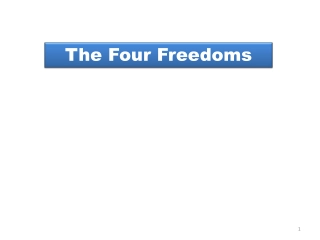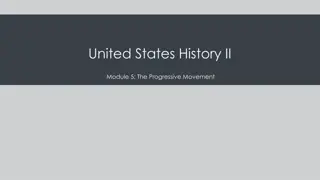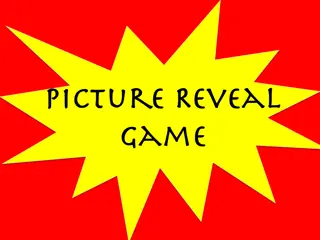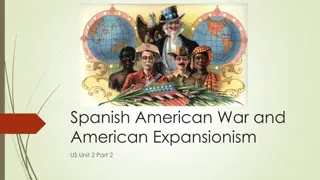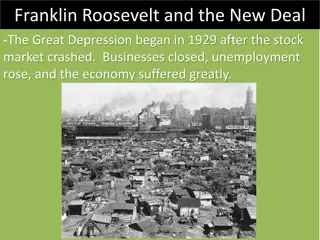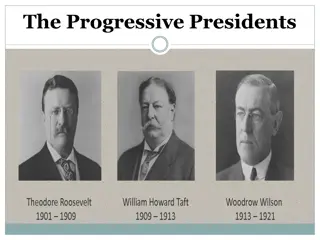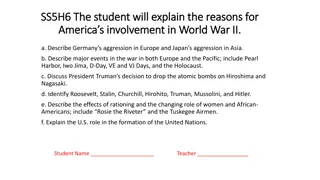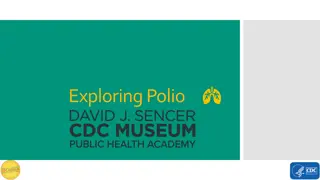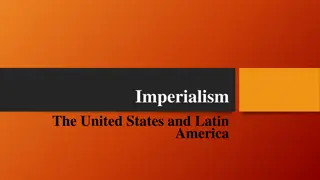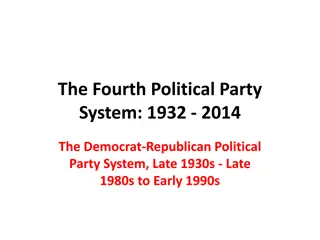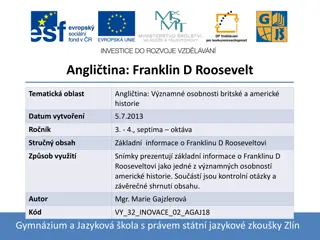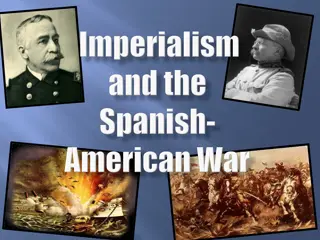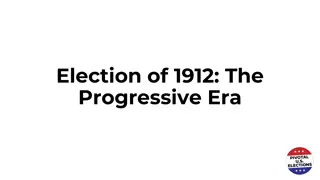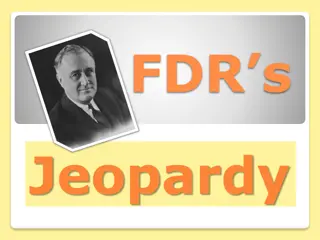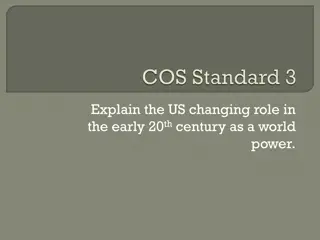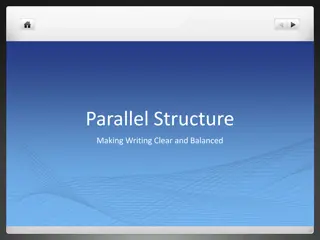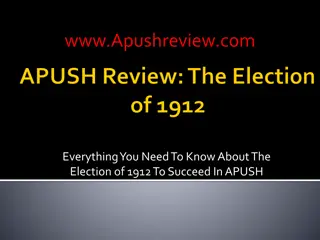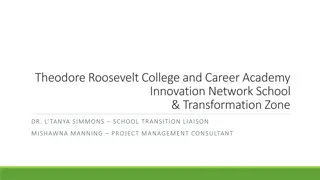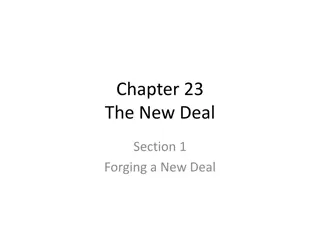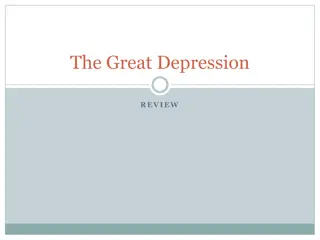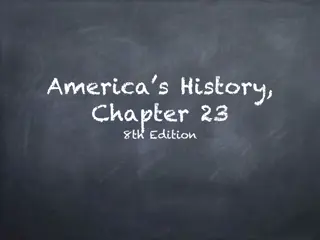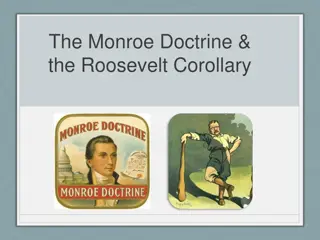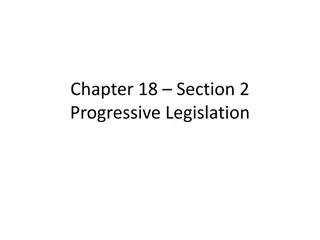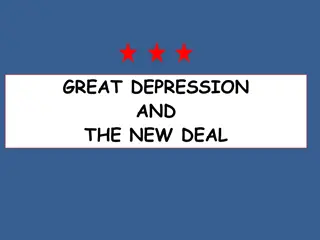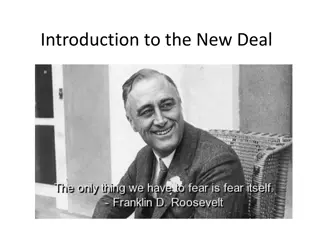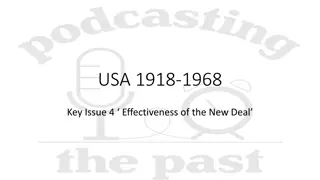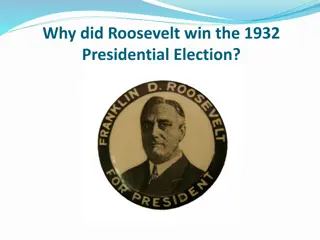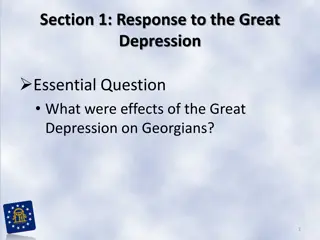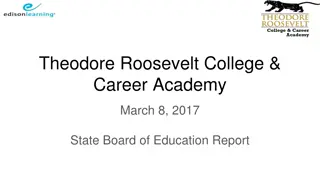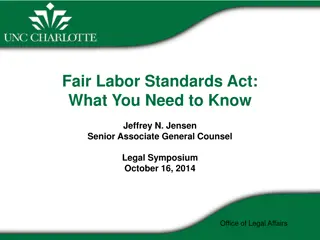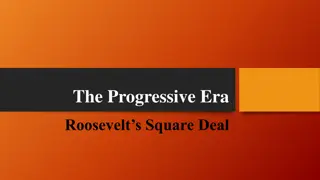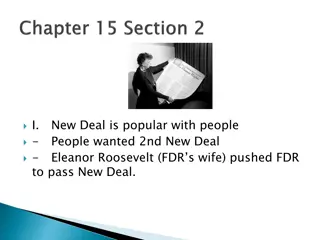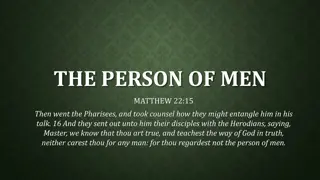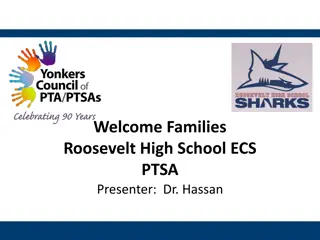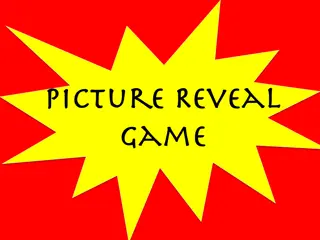The Four Freedoms
Delve into "The Four Freedoms" concept advocated by novelist1 and former US President Franklin D. Roosevelt, encapsulating freedom of speech and worship, and freedom from want and fear. This vision symbolizes the ideals of a democratic society and remains relevant in contemporary discussions on righ
0 views • 23 slides
Understanding the Progressive Movement in United States History II
Explore the Progressive Movement in US History II Module 5, focusing on major movements, politics, muckrakers' role, reform leaders, women's rights, civil rights, and progressive policies under Roosevelt, Taft, and Wilson. Learn about grassroots Progressivism, social justice reformers, the Triangle
4 views • 38 slides
Pictur.e.Reveal.Game - Answer Questions and Uncover Hidden Picture
Dive into the Pictur.e.Reveal.Game where you answer questions related to Franklin D. Roosevelt, the Great Depression, and the New Deal to reveal a hidden picture. Test your knowledge and uncover historical facts as you progress through the questions and reveal the hidden image piece by piece.
1 views • 22 slides
Spanish-American War and American Expansionism: A Look Back in History
Explore the causes and impacts of the Spanish-American War, including the influence of Yellow Journalism, nationalism, and imperialism on American expansionism during the late 1800s. Learn about key figures like Theodore Roosevelt and the Rough Riders, and the significance of policies like the Monro
0 views • 25 slides
Franklin D. Roosevelt and the New Deal During the Great Depression
The Great Depression of 1929 led to high unemployment, closed businesses, and economic suffering. President Hoover's laissez-faire policies failed to address the crisis adequately. In the 1932 election, FDR introduced the New Deal with a focus on Relief, Recovery, and Reform to combat the Depression
2 views • 13 slides
Origins of the Cold War: Yalta and Potsdam Conferences 1945
The Cold War's origins stem from the tensions and suspicions between the USSR and the West post-World War II, highlighted through conferences like Yalta and Potsdam. At the Yalta Conference, held in February 1945, crucial decisions were made regarding Germany, Poland, and the UN. The Potsdam Confere
0 views • 10 slides
Progressive Presidents' Initiatives and Reforms in the US
Explore the impact of Progressive Presidents like Theodore Roosevelt on business regulation, consumer protection, labor conditions, and environmental conservation in the early 20th century. Learn about key laws passed, initiatives taken, and the overall drive towards reform during this period.
5 views • 20 slides
America's Involvement in World War II: Causes and Impact
In this detailed study guide, students will explore the reasons behind America's involvement in World War II, including Germany and Japan's aggression, major events in Europe and the Pacific, President Truman's decision to drop atomic bombs, key figures like Roosevelt and Hitler, and the effects of
0 views • 13 slides
Exciting 2024 Roosevelt Teddy Football Season Updates
Get ready for an exciting 2024 football season with the Roosevelt Teddy Parents Group! The coaching staff emphasizes building character alongside football skills, defining success through love, responsibility, courage, and humility. Check out the coaching staff lineup, varsity football schedule, and
1 views • 10 slides
Understanding Polio: Causes, Spread, and Eradication Efforts
Polio, a disabling and life-threatening disease caused by the poliovirus infection, can spread through contact with infected feces or droplets from sneezes/coughs. It mainly affects children, potentially leading to paralysis or respiratory issues. Lack of clean water and sanitation contributes to it
0 views • 15 slides
United States Imperialism in Latin America
United States' involvement in Latin America, particularly in Puerto Rico and Cuba, post-Spanish-American War, showcased a shift towards imperialism. Policies such as the Foraker Act and the Platt Amendment highlighted American efforts to exert influence in the region, leading to mixed reactions from
0 views • 25 slides
Political Divisions and Purges in the Democrat-Republican Party System (1932-1938)
Divisions surfaced within the Democrat-Republican Party System in the late 1930s, marked by disputes over policies like Roosevelt's Court Packing Scheme and the Fair Labor Standards Act, leading to friction between Northern and Southern Democrats. President Roosevelt's attempt to purge conservative
0 views • 16 slides
Franklin D. Roosevelt: The Influential 32nd President of the United States
Franklin D. Roosevelt, also known as FDR, was a significant figure in American history. He served as the 32nd President of the United States and was the only President to be elected four times. Despite battling polio, he led the country through the Great Depression with his New Deal program. Rooseve
0 views • 11 slides
Georgia Studies Week at a Glance: February 21-25, 2022
This week in Ms. Smith's Georgia Studies class focuses on the impact of World War II on Georgia's development economically, socially, and politically. Students will delve into events leading to American involvement in the war, the contributions of key figures and industries in Georgia, and the role
0 views • 9 slides
The Spanish-American War: Origins and Impact
The Spanish-American War was fueled by a combination of factors including economic struggles, imperial ambitions, and sensationalist journalism. Theodore Roosevelt's stance on war, coupled with the desire for Cuba's independence from Spain, led to a call for war in the late 1890s. Yellow journalism
0 views • 18 slides
The Election of 1912: Competing Visions in American Society
The Election of 1912 during the Progressive Era showcased competing visions on how the federal government could address American society's challenges. Progressives sought reform, social control, and government intervention, impacting the Republican Party's split. Candidates included Wilson, Roosevel
0 views • 8 slides
FDR's Jeopardy: A Historic Quiz Challenge
Explore the depths of history with FDR's Jeopardy, featuring questions on Franklin D. Roosevelt, The Great Depression, The New Deal, WWII, and more. Test your knowledge on significant events and figures from the past, and unravel the mysteries of the eras that shaped our world.
0 views • 29 slides
Role of the US as a World Power in the Early 20th Century
The United States underwent a significant transformation in the early 20th century, emerging as a prominent world power. This shift was marked by key events such as the formation of the Rough Riders under Theodore Roosevelt, the involvement of African American regiments in the Spanish-American War,
0 views • 15 slides
Enhancing Writing with Parallel Structure
Explore the concept of parallel structure in writing, its importance, and how it can improve the clarity and balance of your written work. Learn from famous examples by Eleanor Roosevelt and Martin Luther King, Jr., while also understanding the pitfalls of faulty parallelism. Discover how correct pa
0 views • 8 slides
Election of 1912 and Its Impact on APUSH Students
Explore the dynamic Election of 1912 in US history, featuring William Howard Taft, Theodore Roosevelt, Woodrow Wilson, and Eugene Debs. Learn about the split in the Republican Party, Wilson's victory, Debs' Socialist impact, and the rise of the Progressive Party. Subscribe for more educational conte
0 views • 5 slides
Project Management for Theodore Roosevelt College and Career Academy Innovation Network School Transformation
Develop a comprehensive plan for project management at Theodore Roosevelt College and Career Academy, focusing on key benchmarks such as recruitment, data collection, existing agreements, and concrete planning. Engage with stakeholders to ensure successful implementation through effective communicat
0 views • 11 slides
The New Deal: Forging a Path Out of the Great Depression
The New Deal, implemented during the Great Depression in the 1930s by President Roosevelt, aimed to provide relief, create jobs, and stimulate economic recovery through a series of government-run programs. The era also saw changes in the inauguration date to reduce the time a lame-duck president rem
0 views • 9 slides
Insights into the Great Depression Era
Explore key aspects of the Great Depression era, including concepts like rugged individualism, President Roosevelt's strategies, challenges faced by farmers in the Great Plains, the legacy of the New Deal, and significant events such as the 1932 presidential election. Engage with historical quotes a
0 views • 22 slides
The New Deal: Roosevelt's Response to the Great Depression
The New Deal, implemented by President Franklin D. Roosevelt in the 1930s, aimed to provide relief, recovery, and reform during the Great Depression. It included programs such as the Federal Emergency Relief Administration, Public Works Administration, and Civilian Conservation Corps to address unem
0 views • 16 slides
The Monroe Doctrine and the Roosevelt Corollary: Evolution of US Foreign Policy
The content explores the historical context and evolution of US foreign policy through the Monroe Doctrine of 1823 and the Roosevelt Corollary of 1904. It discusses the principles outlined in each doctrine, their implications on US interactions with other nations in the Western Hemisphere, and the s
0 views • 4 slides
Progressive Reforms in the United States
Progressive movements in the United States during the late 19th and early 20th centuries led to significant legislative changes at the federal, state, and municipal levels. Efforts focused on expanding the role of government in social welfare programs, municipal reforms to combat corruption, innovat
0 views • 10 slides
The Great Depression and The New Deal: Causes, Impact, and Solutions
The Great Depression of the 1930s was a period marked by economic devastation, high unemployment, and social upheaval. Overproduction, speculation, uneven income distribution, and shaky banking practices led to the economic collapse. The human impact was severe, with high unemployment, bank failures
0 views • 8 slides
Uncovering the Impact and Legacy of the New Deal Era
Explore the history of the New Deal, Franklin D. Roosevelt's transformative initiatives during the Great Depression, and the lasting effects of these policies on American society. Delve into the critical aspects of the New Deal such as banking reforms, work programs, and FDR's leadership style. Unde
0 views • 37 slides
Effectiveness of the New Deal in Restoring Confidence and Addressing Economic Problems
In the context of the USA during 1918-1968, the New Deal implemented by President Franklin Roosevelt was aimed at addressing the devastating effects of the Great Depression. By restoring confidence in the banking system through measures like the Emergency Banking Act and engaging with the public thr
0 views • 18 slides
Understanding Roosevelt's Victory in the 1932 Presidential Election
In the 1932 Presidential Election, Franklin D. Roosevelt won a landslide victory over Herbert Hoover, leading to a significant shift in political power from the Republicans to the Democrats. This marked the beginning of Roosevelt's presidency and the implementation of the New Deal in response to the
0 views • 17 slides
Effects of the Great Depression on Georgians: A Historical Perspective
The Great Depression had profound effects on Georgians, leading to growing unemployment, bank failures, and loss of homes and farms. President Franklin Roosevelt's New Deal brought hope for improvement. Life in Depression Georgia saw contrasts, as some businesses thrived while many workers and farme
0 views • 7 slides
Transformation Journey of Theodore Roosevelt College & Career Academy
Theodore Roosevelt College & Career Academy embarked on a transformative journey to enhance student proficiency and college readiness. By identifying systematic and academic challenges, implementing strategic plans, and embracing high-impact changes, the academy aimed to maximize student potential t
0 views • 24 slides
Understanding the Fair Labor Standards Act (FLSA)
The Fair Labor Standards Act (FLSA) was signed into law in 1938 by President Franklin D. Roosevelt to address child labor, establish minimum wage, and regulate work hours. It sets standards for minimum wage, overtime pay, recordkeeping, and youth employment, impacting both private and government sec
0 views • 56 slides
The Progressive Era: Roosevelt's Impact on the Modern Presidency
Theodore Roosevelt's presidency marked a significant shift towards Progressive ideals, shaping the way Americans viewed the government. From his early life to his Square Deal reform program, Roosevelt's dynamic leadership and dedication to fighting corruption left a lasting impact on American politi
0 views • 17 slides
Impact of the New Deal Policies in the 1930s
The New Deal policies initiated by President Franklin D. Roosevelt during the 1930s aimed to address the challenges of the Great Depression. The programs provided relief to the unemployed, created jobs through public works projects, and established social security measures. Eleanor Roosevelt played
0 views • 7 slides
Deception and Truth in Biblical Context
Pharisees try to entangle Jesus with their questioning, warning of false Christs and prophets. The urgency of seeking God in the midst of confusion and deception is emphasized, with references to the famine for God's Word and the choices between God's Holy Spirit and the devil's spirit. A tale of Th
0 views • 27 slides
Best Kitchen Renovation in The Elm
If you\u2019re looking for a Kitchen Renovation in The Elm, contact Roosevelt Renovation. They specialize in transforming spaces with expert bathroom, basement, and kitchen renovations, tailored to meet your style and functionality needs. Their skill
0 views • 6 slides
The Impact of the Great Depression on the 1932 Election
The election of 1932 was heavily influenced by the Great Depression, with high unemployment and economic turmoil shaping the candidates' platforms. Franklin D. Roosevelt's victory marked a shift towards a more active role for the federal government in addressing economic and social challenges, as op
0 views • 7 slides
Welcome to Roosevelt High School PTSA Event Overview
Welcome families to Roosevelt High School's PTSA event. Dr. Hassan will present important information including school schedules, faculty members, and ways to stay connected. Learn about PTSA's advocacy work in education and how parents can support a safe learning environment and college and career
0 views • 11 slides
Pictur.e Reveal Game - Question & Answer Challenge
Get ready to test your knowledge about Franklin D. Roosevelt and the New Deal through a fun and interactive game. Answer a series of questions correctly to reveal a hidden picture step by step. Learn interesting facts about FDR's presidency and the impact of the New Deal on American history.
0 views • 22 slides
